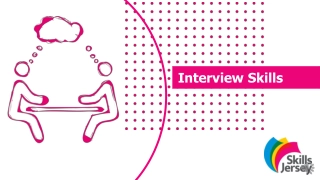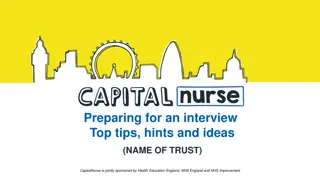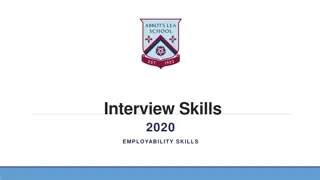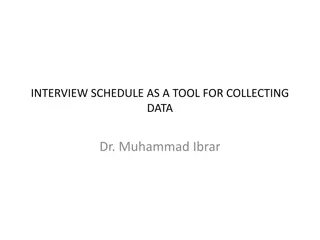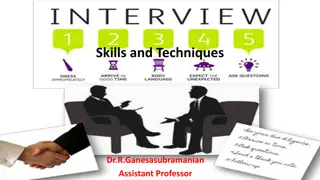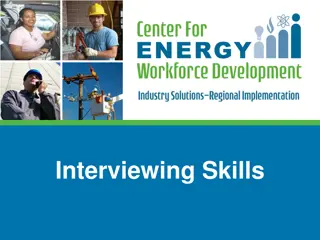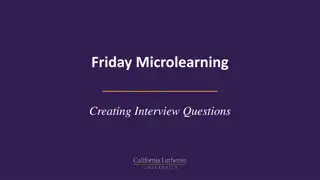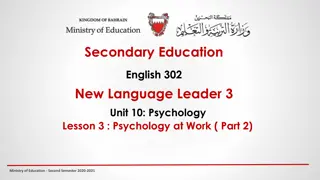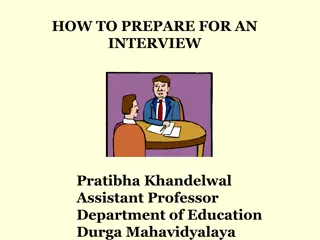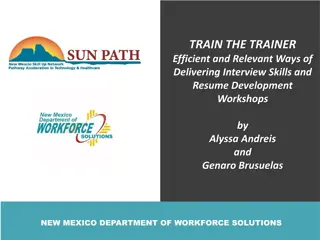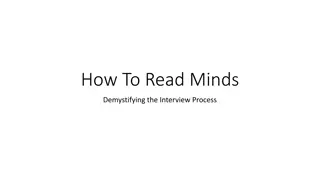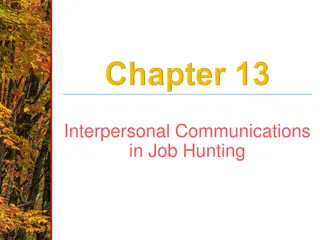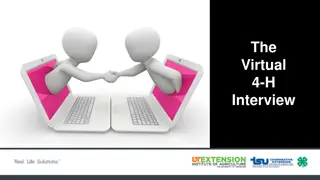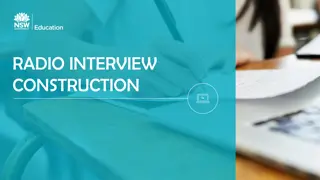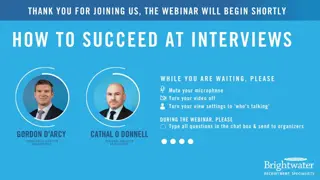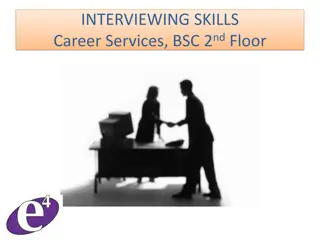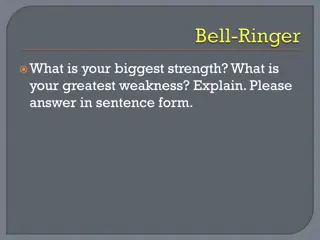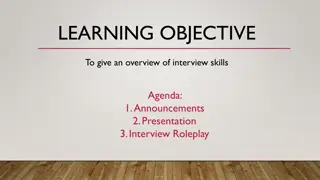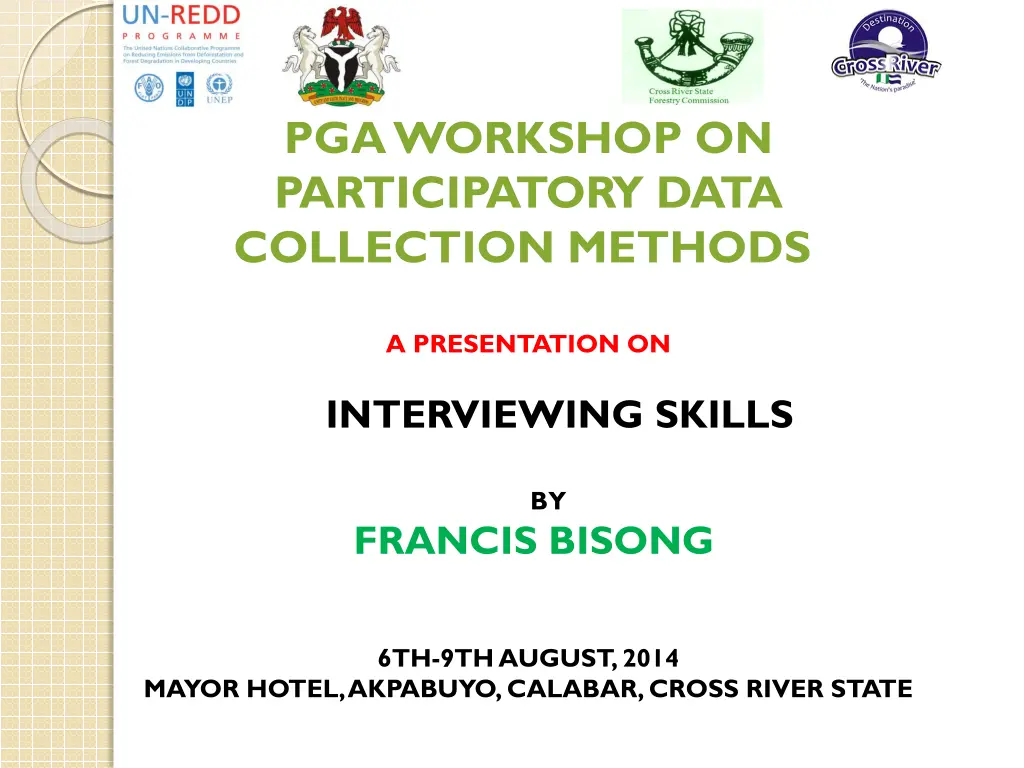
Interviewing Skills Development Tips
Enhance your interviewing skills with these essential tips for effective communication, cultural awareness, and teamwork. Learn to formulate questions, foster participation, and maintain a smooth flow of interviews while respecting local customs and protocols. Avoid monopolizing answers and gracefully conclude unproductive interviews.
Download Presentation

Please find below an Image/Link to download the presentation.
The content on the website is provided AS IS for your information and personal use only. It may not be sold, licensed, or shared on other websites without obtaining consent from the author. If you encounter any issues during the download, it is possible that the publisher has removed the file from their server.
You are allowed to download the files provided on this website for personal or commercial use, subject to the condition that they are used lawfully. All files are the property of their respective owners.
The content on the website is provided AS IS for your information and personal use only. It may not be sold, licensed, or shared on other websites without obtaining consent from the author.
E N D
Presentation Transcript
PGA WORKSHOP ON PARTICIPATORY DATA COLLECTION METHODS A PRESENTATION ON INTERVIEWING SKILLS BY FRANCIS BISONG 6TH-9TH AUGUST, 2014 MAYOR HOTEL, AKPABUYO, CALABAR, CROSS RIVER STATE
INTERVIEW SKILLS PR practitioners must develop the following skills: Considerable communication skills with different types and categories of people An intense curiosity-observation insight/mind/hearing Exceptional sensitivity; Situation awareness Noticing fine changes Events Sounds Diversities of people Positions/status/cultural rulers etc.
INTERVIEW SKILLS CONTD A non-attachment to power or status Developing capacity to continuously absorb, classify, categorize and sift through the constant stream of information generated by the study Deductive and inductive analysis of information Cross-cultural awareness and cross-cultural communication skills (differences in language, sex, social category, attitude experience etc.)
INTERVIEWING SKILLS CONTD Foster and practice of participation for all relevant segments Teamwork skills to ensure team performance Commitment , Use open ended questions Put the interviewee at rest
INTERVIEWING SKILLS CONTD Formulate transition for smooth flow of interview Interject probes by using prompts such as why, what, where, when, who for elaboration and to clear confusing issues Group the questions and prioritize them Keep it short Pilot it
INTERVIEWING SKILLS CONTD Be casual and informal Interview should be flexible, yet controlled Interview team should be 3-5 persons Begin with greetings in local language, follow local protocols Begin by referring to something Use checklist to raise issues All team members to take note except, one interviewing
INTERVIEWING SKILLS CONTD Team members must not argue or contradict one another Politely terminate unfruitful interviews Ensure there is no monopoly of answers/direct questions to group yet to contribution Don t show approval/disapproval Share gifts of food, drinks, kola etc.
STARTING THE INTERVIEW CONTD Introduce the team Introduce objectives and the big picture for common understanding Introduce why the community, the group or individual is chosen for the interview Give expected duration of the interview Ensure confidentiality and anonymity
STARTING THE INTERVIEW CONTD Seek their consent especially for recording with tape Allow audience to ask questions Avoid discussing expected outcomes Record dates, time, place and audience for the interview Begin with simple questions that are easier to answer before transiting to sensitive ones
GETTING ON WITH INTERVIEWS Ask short, simple and easy questions Listen attentively, remember the objective Steer the interview in the direction of the objectives Skip questions that are not relevant to the people and situation One question may lead to responses for other questions be sensitive to this overlap and move on Probe to see if there is any addition to answers earlier given Don t be judgmental if something sounds strange
THE DONTs Avoid leading questions one that leads interviews to certain response Avoid loaded and complex words which may lead to different response (jargon free). Avoid closed questions Avoid multiple elements in questions, questions should be specific at a time Avoid explanations on expected answers and outcomes, it may lead to bias Don t ask questions already answered earlier Do not state your opinion or argue on anything
AFTER THE INTERVIEW Ask the interviewee of any additional information Give time for them to ask some questions Thank them for their time Record time the session ended For tape recording, tape your voice time ended Cross check notes for further clarification and if the objectives have been met
ATTRIBUTES OF INTERVIEWERS Sensitivity to various moods, meanings, nuances, expressions, responses etc. Good interpreters of moods and expressions Alert Willing learners Willingness to embrace error and mistakes Good facilitators
PRA TEAM A size of 2-5 people to combine disciplines and experience including: Social scientist-sociologist, economist, anthropologist, community development expert, human geographer, Natural scientist-forester, agronomist, biologist, physical geographer, One insider familiar with the area, people, culture, one woman
PRA TEAM CONTD Appoint a team leader Sub-divide the team for particular tasks The team should learn to work together with team action: Forming Storming Norming Performing (Pretty, 1998) Discuss objectives at an early stage Build mutual trust and understanding among members
PRA TEAM CONTD Team must have a common enemy, that is an objective so common that it make sense to each individual to make trade offs The team leader to build cohesiveness and ability to build consensus Constant group discussion during breaks to stimulate more thinking, sharing and performance
ROLES FOR TEAM MEMBERS Members must take up different roles: oInitiator oInformation seeker oListener oCreator oClassifier oStandard setter oSummeriser
ROLES FOR TEAM MEMBERS CONTD oGenerator of urgency oPractical organizer oEncourager oCompromiser oTension reliever oStubborn one oDiscipline one
COMMON ERRORS IN INTERVIEWING Failing to listen closely Repeating questions Helping out interview Asking/argue/insensitive question Failure to probe Being unaware of elite bias
COMMON ERRORS IN INTERVIEWING Being unaware of concreteness bias Being unaware of hypothesis confirmation bias Being aware of consistency bias prematurely searching for coherence Keeping interview for too long
TECHNIQUES TO FACILITATE INTERVIEW Semi-Structured Interview (SSI) is the heart of PR It is a skill to be developed through practice: Core activities of SSI are: Observe: keep eye open and take all observable information rely on carefully selected indicators, Team work is crucial May be followed by direct measurement allows better sensitivity
TECHNIQUES TO FACILITATE INTERVIEW CONTD Conserve: dialogue, talk with people and listen to them Record: Discreetly take notes to be developed later Process: The team members should: Thoroughly discuss and agree on themes and objectives Draw up a checklist (interview guide) Draw up sample of respondents
TECHNIQUES TO FACILITATE INTERVIEW CONTD Draw up sites Use triangulation to ensure validity and reliability TYPES of SSI Group Interviews: To generate broad debate in order to arrive at consensus
TECHNIQUES TO FACILITATE INTERVIEW CONTD To obtain knowledge of community relations Natural resources Local histories Sensitive information where individuals may be reluctant or penalized if given Capture variability within the community Reveal what people believe are preferred patterns , goals and aspirations
TECHNIQUES TO FACILITATE INTERVIEW CONTD Key Informant: interviews to obtain special perspective from specialists and people with special interest Individual respondents: interviews to obtain representative information

